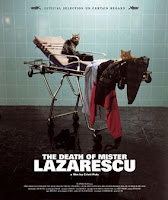
Tuesday, February 24, 2009
"Turtles Can Fly"

Tuesday, February 17, 2009

Cristi Puiu's "The Death of Mr. Lazarescu" is a Romanian film that takes place at various hospitals around the country's capital of Bucharest. The film opens with Dante Remus Lazarescu, a 63 year old drunkard, sick and inebriated calling an ambulance. After realizing that the ambulance may not be arriving too soon, he asks the neighbors for help. Once they realize how sick he actually is, the ambulance finally shows up and takes him to the hospital. Lazarescu and the ambulance nurse travel from hospital to hospital to find that he is either not important enough to acquire adequate care, or that the nurses and doctors were too tired or bored to help the poor old alcoholic. As the night goes on we receive a whole laundry list of things possibly wrong with Mr. Lazarescu, from colon cancer to cirrhosis to a brain hematoma. Through the ambulance's nocturnal journey through Bucharest, Lazarescu urinates and deficates on himself as his condition worsens with each hospital visit, After being rejected from three hospitals, the fourth one agrees to operate on his brain hematoma. Throughout the course of the film we are able to note common trends in recent Romanian cinema, such as long takes and fixed camera angles, bland lighting, drab decor and plain, realistic dialogue. Puiu uses the dark lighting and regular sets to portray post-communist Bucharest in its most natural state. The film is fairly lengthy as a direct effect of the realistic nature of the film. Romanian cinema is known for using takes and dialogue that seem to drag on to bring the viewer into the life of the film. As we follow Mr. Lazarescu through this journey, Puiu uses these long takes for us to get to know "Uncle" Lazarescu and we begin to feel for him as he keeps getting denied moving from hospital to hospital. The long dialogue seems to drag on at first, but as the film progresses you realize that it is used to make you feel a part of the conversation. This minimalist aspect shows how recent Romanian cinema, stripped to its fundamentals, connects with the viewer. "The Death of Mr. Lazarescu" is the poster child for Romanian cinema, and completely conveys the importance of the many aspects commonly shown in Romanian films.
Monday, February 9, 2009
Joint Security Area

Joint Security Area is a Korean film directed by Park Chan-wook. The story of this film took place on the border of the Northern and Southern Korean Territory at the
Chan-wook does a great job of relying on flashbacks to uncover the truth behind the conflict. As Major Sophie discovers what happened, flashbacks give clips of information to inform the viewer of the situation. He allows the jump between past and present to be evident and easy to follow because all of the flashbacks are dimly lighted. There is barely any light in all of the scenes that involve the flashbacks. This creates a mysterious atmosphere of the scenes. The camera angles and speed of the scenes are also used to help to intensify emotions, such as when
The important theme in this film is that of friendship and comradery. An unlikely friendship sprang up when two Northern soldiers saved the life of a Southern soldier. The relationship between these unlikely friends evolved into a potential to bring peace to the two opposing forces. Throughout the film, you see the struggles that these relationships go through and endure. In the end it is evident that friendship is strong, but sometimes it just isn't strong enough. Overall, this film is very entertaining and I would encourage anyone to see it!
Tuesday, February 3, 2009
"Nine Queens" Review
Although the movie is in Spanish, just by following the subtitles, the movie is still very thrilling. The plot contains many twists and turns that surprises the audience and wants them to continue watching. The two main characters act very well as actors and as thieves, and both contribute greatly to the film. While the theft and corruption may be seen mostly because of the state that Argentina is in at the time, the morals expressed throughout the movie are those that can be seen internationally. The importance of family seems to be very important in the different jobs, and for the most part, it leads to a character’s downfall. By seeing how trusting Argentinean people are with their family shows that although there is such a great amount of corruption, family comes first. Even Marcos’s sister participates in the job only to repair family ties.
Overall, “Nine Queens” is a great film that reveals two major themes, the importance of family in Argentina and the corruption there. The plot intertwines the two and creates a fantastic thriller. The film applies mostly to Argentina, but can be definitely understood by all audiences.